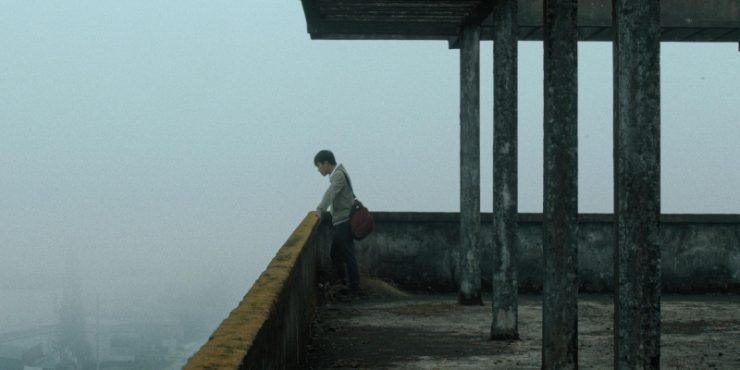It is undeniable that the cinematic skill in Inside the Yellow Cocoon Shell is peerless. It’s camera technique – the brilliance with which it alters the frame within single shots, the grace with which it moves between wide shots and close-ups without sacrificing focus – feels like a masterclass. This is the feature debut from Vietnamese director Pham Thian An, and he’s coming out of the gate red hot, rubber stamping his virtuoso talent from the movie’s opening moments. At over three hours long, Pham gets his money’s worth of lingering takes, static imagery that can lay motionless for minutes at a time. This rivals Tarkovsky and Weerasethakul in its slowness, and while Pham may possess those filmmakers’ eye for imagery, he does not have their command of visual storytelling. It doesn’t take long to realize that Cocoon Shell is spinning its wheels.
Le Phong Vu plays Thien, a young man whose idle life is disrupted when his sister-in-law is killed in a motorcycle accident. His young nephew, Dao (Nguyen Thinh), survives. Thien’s brother abandoned his wife and son long ago, so it’s up to Thien to take care of Dao, but he’s not well-equipped for the assignment. His days are spent lounging around various drinking posts and partaking in sensual massages. Thien takes the responsibility seriously, though, keeping Dao in his apartment and escorting him to his mother’s funeral. Thien is forced to sit through long, devout, Catholic ceremonies that he can hardly take seriously. After the funeral, Thien takes Dao to the countryside, and begins asking around for his brother’s whereabouts. He meets an elderly, anti-communist veteran of the Vietnam War and runs into an old sweetheart (Nguyen Thi Truc Quynh) who has since become a nun.
There’s never a moment where Cocoon Shell is strictly following plot, but once we’re into the film’s second hour, Pham gives up any pretenses of trying to create a story arc. Thien’s travels become more and more ponderous, the camera’s wandering eye becoming more and more unfocused. There’s lots of Christian imagery, and what little dialogue the film has usually centers on Thien’s existential crisis, contemplating the evils of the universe while continuing to be available to the pure, innocent Dao. The aesthetic choices here are strident – pretentious might be a better word for it. In the film’s opening moments, I found the beautiful shots almost hypnotic, and Pham’s talent seems otherworldly. But as the film unfolds, it becomes clear that there is little depth here, and for those last two hours I really found myself counting the minutes.
Written and Directed by Pham Thien An










